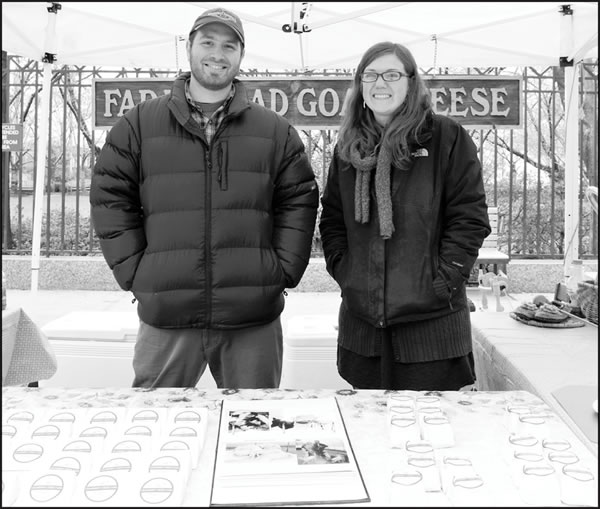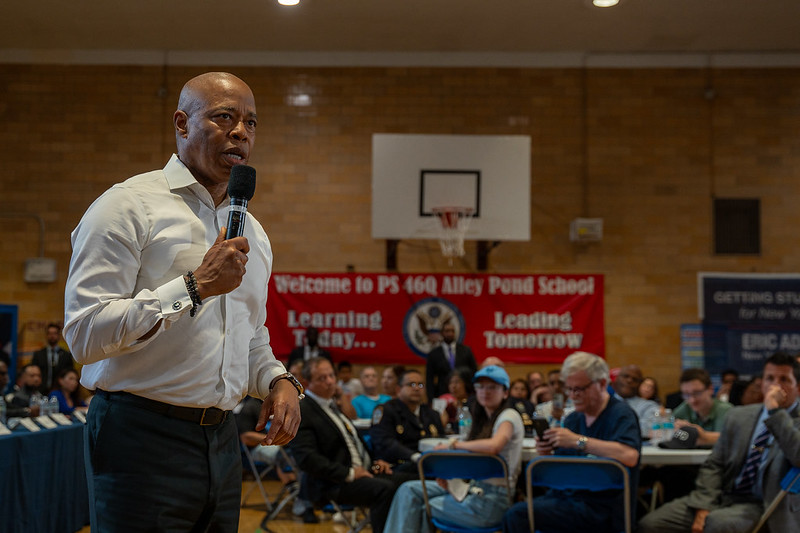BY Terese Loeb Kreuzer
It takes two to three hours each way to get from Paradise Valley to Battery Park City, depending on traffic. Jeff Henry and Mary-Jean Bendorf of Cranberry Creek Farm in the Pocono Mountains of Pennsylvania have been making the trip every Thursday since the World Financial Center Greenmarket opened for the season on April 7.
“Is it really paradise in Paradise Valley?” a customer asked them. “Yes,” Bendorf said.
Cranberry Creek Farm is on land that has been in Henry’s family for generations. An ancestor, Eugene Henry, who emigrated from Ireland in the 1700’s, acquired 5,000 acres in what is now Monroe County from William Penn’s sons. Eugene Henry started a farm and had a gristmill on the property. For years, the land remained a farm, but Jeff Henry’s great-grandfather, Sanford, was the last to farm the land and keep livestock. His son, Wesley, started a trout hatchery, and Wesley’s son, William (Jeff’s dad), joined the Navy and went to engineering school.
Nevertheless, Jeff wanted to be a farmer. On Cranberry Creek Farm’s Facebook page, he lists his employer as “Earth” and describes himself as the “caretaker” of Paradise Valley.
Jeff, 29, and Mary-Jean, 30, met five years ago, and according to Bendorf, immediately fell in love. Bendorf, who comes from Willow Grove in suburban Philadelphia, describes herself as a “farmerette” at Cranberry Creek Farm. (It’s named for the creek that flows through the property.)
Bendorf and Henry now have 16 goats for milking and 27 kids that were born this year. Once a week, they make small batches of goat cheese that they bring to the Battery Park City market. They spend five to six hours in their cheese room, flipping and draining the cheese, and then age it for two to three months in an underground cheese cave that they built, where the temperature is around 50 degrees Fahrenheit. They started their cheese-making three years ago but only started “getting serious about it,” according to Bendorf, in the last year. Now they make a soft, spreadable goat cheese and a harder cheese that they call “Eugene.” Soon they will also be making gouda.
In addition to their goats, they have around 160 chickens whose eggs they bring to the market, and a vegetable garden that will yield garlic, heirloom tomatoes, heirloom salad mix, carrots and several kinds of potatoes later in the season.
They also have a few sheep. Bendorf dyes their wool with natural pokeberry dye and crochets slippers that she sells for $140 a pair. (She will make them to order.)
Though many landmarks in and near Paradise Valley bear the Henry name (Henry’s Crossing Road, the village of Henryville — population, 1,974 — and the Henryville Inn), Jeff Henry’s parents now own just 100 acres of the original land grant and Jeff and Mary-Jean are farming five of those acres. But their goats have the run of the whole property.
“The goats do better browsing than on pasture,” Henry says.
On market day, Henry and Bendorf get up before 4 a.m. to make the trip into the city. A family living in a rented house on the property does the chores that day, which include milking, feeding chickens, pigs and goats and loading the wood furnace that heats the greenhouse, the floors in the goat barn, the vat for cheese making and the drinking water. Henry and Bendorf get back around 10 at night, with Henry driving their ancient Toyota truck, which has 180,000 miles on it. Bendorf says she falls asleep as soon as they get on the highway.
It’s a physically demanding life, but purposeful. “In my day-to-day activities, I try to envision how I can meet the goal of becoming a self-sustaining, bio-diverse farming operation,” Henry says. “By sustainable, I mean producing food on the farm without any outside inputs like fertilizer and feed.” He says that’s difficult because the land is rocky and not very fertile. But he says, he sees his farm as part of a larger eco-system and his goal is “to keep the health and productivity of the agricultural land as well as the forested, wild lands as they were — or better than they were when I arrived.”
For more information about Cranberry Creek Farm, go to www.CranberryCreekFarm.com. Bendorf and Henry are in the World Financial Center Greenmarket at Liberty Street and South End Avenue on Thursdays. The market will be open through Dec. 22.
































